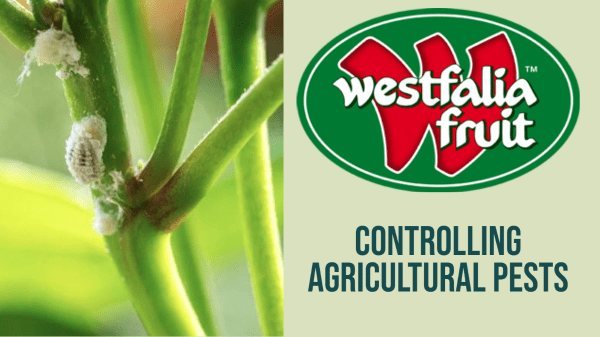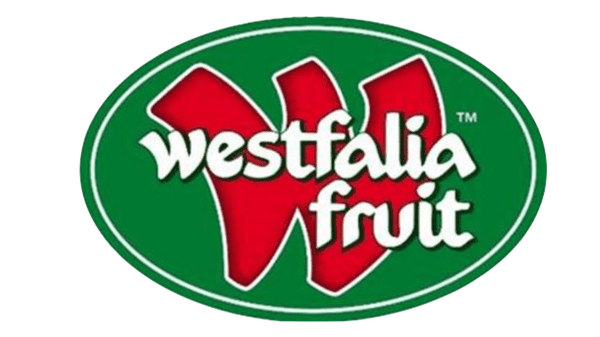
Westfalia Fruit Group, BB #:300553 a leading multinational supplier of fresh vegetables and fruit is embracing entomology for sustainability, with a pioneering project in Chile rearing insects to naturally control agricultural pests such as Mealybugs and White scale.
In a large demonstration scheme to show that a shift to more sustainable production management is possible, Westfalia Fruit Chile is targeting biological control as the preferred method of crop management. Using insects and other natural control methods may also contribute to Westfalia’s global target to enhance tree health and minimize the use of pesticides.
The company has an insect rearing facility at Pomaire, west of Santiago, on one of its biggest and most significant farms. Working with specialists, the facility produces beetle predators such as Rhyzobius lophanthae and Coccidophillus citricola for the control of White scale in avocado and Red Scale in citrus, as well as Cryptolaemus montrouzieri, known as ‘Mealybug destroyer’ for the control of Mealybugs in citrus, avocados and blueberries.
This large, ground-breaking project is initially being rolled-out on the company’s farms in Chile. “This season we are targeting 70% of our own farms to be participating in insect release programs and that increases to 100% for citrus and avocado,” said Juan Enrique Ortuzar, Westfalia’s R&D manager in the country.
“We are developing and testing the program on our commercial farms and when we have proof of concept, we will communicate this initiative with our growers and offer them insects if they would like to join. We have also started training our team so that they can educate and support growers as we roll this out,” Ortuzar continued.
In the last year, Westfalia Fruit Chile has developed an insect release plan for each participating farm, with insects reared for each season and fruit that is grown. On all the farms, managers practice Integrated Pest Management (IPM) which now includes insect releases and at the packhouses a high-pressure washer in to eradicate the small number of pests that remain.
“We live with, for example, White scale in the orchard but we are well below the so-called economic damage threshold. By practicing IPM we deliver a quality product in a very safe and natural way,” explained Ortuzar.
To complement the use of insects for natural pest control, the Westfalia Chile team is also trialling mild plant treatments using pheromones, a new approach that causes sexual confusion for some pests, increasing control success without disrupting the natural balance of the orchard.
This project has shown such success that it has already grown from Chile to Colombia which faces extreme pest and disease challenges. Westfalia’s Colombian farms had already decreased their pesticide applications through this new program.
“The whole idea is to reduce chemical treatment to a minimum and we believe we can achieve that with this kind of approach. It’s interesting because once you start this journey the more you learn and we are developing our own ideas and changing procedures based on our growing experience and successes. If our project could serve as a model for Westfalia globally we would be very proud,” Ortuzar concluded.
About Westfalia Fruit
The multinational Westfalia Fruit Group is a leading supplier of fresh and processed produce to international markets, offering a diverse range of quality fruit and related products via its vertically integrated supply chain. Founded over 70 years ago on guiding environmental, social, governance & sustainability principles. These practices, premised on the legacy of Dr Hans Merensky are at the heart of all that is done by the Group – “To Do Good”, – of which continue to underpin our approach today.
Today, operating in 16 countries spread over 5 continents, the Westfalia Fruit Group prides itself on advancing sustainable agricultural practices and being a responsible corporate citizen within the communities in which it operates.
As a frontrunner in the avocado industry, Westfalia grows, sources, ripens, packs, processes, and markets accredited avocados across the globe throughout the year. Value-added products include avocado oil, low-preservative guacamole, frozen avocado, and dried fruit.
Westfalia grows fruit in all major origins in the Americas and Africa and sources from partner orchards, giving the Group the most diverse avocado-growing footprint in the world. Westfalia’s dynamic and integrated supply chain from research to the consumer benefits all stakeholders. The Group’s research division, Westfalia Technological Services, is the world’s largest privately funded subtropical fruit research unit. Its dedicated team of scientists and technicians focus on varietal development, innovation, and environmental matters, and provides a pivotal role in defining the future of the global avocado industry.
A supplier of choice to retail, wholesale, and food-service customers, Westfalia operates sales offices in the UK, Europe, North America, Latin America, southern Africa, and Asia. Fruit is packed in diverse formats and expertly ripened to deliver optimal eating quality. For more information visit www.westfaliafruit.com.
Westfalia Fruit Group, BB #:300553 a leading multinational supplier of fresh vegetables and fruit is embracing entomology for sustainability, with a pioneering project in Chile rearing insects to naturally control agricultural pests such as Mealybugs and White scale.
In a large demonstration scheme to show that a shift to more sustainable production management is possible, Westfalia Fruit Chile is targeting biological control as the preferred method of crop management. Using insects and other natural control methods may also contribute to Westfalia’s global target to enhance tree health and minimize the use of pesticides.
The company has an insect rearing facility at Pomaire, west of Santiago, on one of its biggest and most significant farms. Working with specialists, the facility produces beetle predators such as Rhyzobius lophanthae and Coccidophillus citricola for the control of White scale in avocado and Red Scale in citrus, as well as Cryptolaemus montrouzieri, known as ‘Mealybug destroyer’ for the control of Mealybugs in citrus, avocados and blueberries.
This large, ground-breaking project is initially being rolled-out on the company’s farms in Chile. “This season we are targeting 70% of our own farms to be participating in insect release programs and that increases to 100% for citrus and avocado,” said Juan Enrique Ortuzar, Westfalia’s R&D manager in the country.
“We are developing and testing the program on our commercial farms and when we have proof of concept, we will communicate this initiative with our growers and offer them insects if they would like to join. We have also started training our team so that they can educate and support growers as we roll this out,” Ortuzar continued.
In the last year, Westfalia Fruit Chile has developed an insect release plan for each participating farm, with insects reared for each season and fruit that is grown. On all the farms, managers practice Integrated Pest Management (IPM) which now includes insect releases and at the packhouses a high-pressure washer in to eradicate the small number of pests that remain.
“We live with, for example, White scale in the orchard but we are well below the so-called economic damage threshold. By practicing IPM we deliver a quality product in a very safe and natural way,” explained Ortuzar.
To complement the use of insects for natural pest control, the Westfalia Chile team is also trialling mild plant treatments using pheromones, a new approach that causes sexual confusion for some pests, increasing control success without disrupting the natural balance of the orchard.
This project has shown such success that it has already grown from Chile to Colombia which faces extreme pest and disease challenges. Westfalia’s Colombian farms had already decreased their pesticide applications through this new program.
“The whole idea is to reduce chemical treatment to a minimum and we believe we can achieve that with this kind of approach. It’s interesting because once you start this journey the more you learn and we are developing our own ideas and changing procedures based on our growing experience and successes. If our project could serve as a model for Westfalia globally we would be very proud,” Ortuzar concluded.
About Westfalia Fruit
The multinational Westfalia Fruit Group is a leading supplier of fresh and processed produce to international markets, offering a diverse range of quality fruit and related products via its vertically integrated supply chain. Founded over 70 years ago on guiding environmental, social, governance & sustainability principles. These practices, premised on the legacy of Dr Hans Merensky are at the heart of all that is done by the Group – “To Do Good”, – of which continue to underpin our approach today.
Today, operating in 16 countries spread over 5 continents, the Westfalia Fruit Group prides itself on advancing sustainable agricultural practices and being a responsible corporate citizen within the communities in which it operates.
As a frontrunner in the avocado industry, Westfalia grows, sources, ripens, packs, processes, and markets accredited avocados across the globe throughout the year. Value-added products include avocado oil, low-preservative guacamole, frozen avocado, and dried fruit.
Westfalia grows fruit in all major origins in the Americas and Africa and sources from partner orchards, giving the Group the most diverse avocado-growing footprint in the world. Westfalia’s dynamic and integrated supply chain from research to the consumer benefits all stakeholders. The Group’s research division, Westfalia Technological Services, is the world’s largest privately funded subtropical fruit research unit. Its dedicated team of scientists and technicians focus on varietal development, innovation, and environmental matters, and provides a pivotal role in defining the future of the global avocado industry.
A supplier of choice to retail, wholesale, and food-service customers, Westfalia operates sales offices in the UK, Europe, North America, Latin America, southern Africa, and Asia. Fruit is packed in diverse formats and expertly ripened to deliver optimal eating quality. For more information visit www.westfaliafruit.com.




